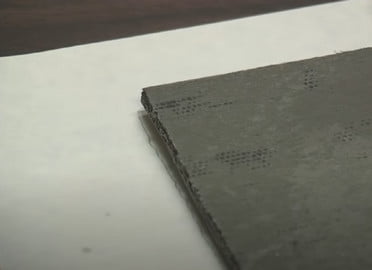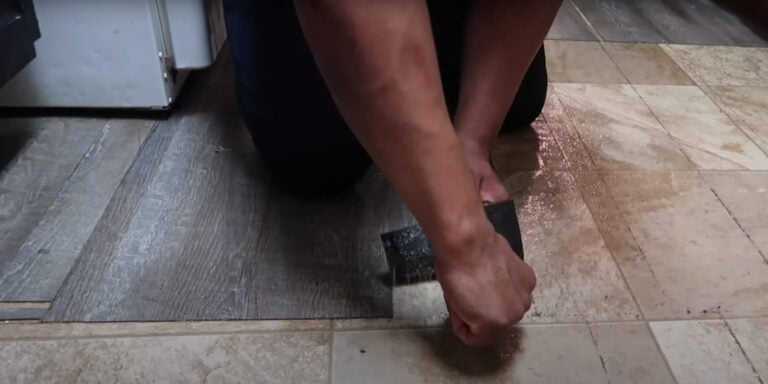Does vinyl flooring expand?
Vinyl plank flooring is growing popular as a home and commercial flooring option. It’s cheaper than real hardwood but durable and luxurious looking. It is either sold as a floating type, where a click-lock flooring tongue and groove system keep them attached hovering just above the subfloor, or glue-down flooring type where it is installed using adhesive tape or a liquid glue product.

In either type, one major flaw of having vinyl planks or tiles is their tendency to expand and contract the flooring over time. So yes, vinyl flooring does expand especially when the weather gets too hot or cold.
Most of the time, each vinyl plank or tile will expand or contract a fraction of an inch. During warmer weather, planks expand which causes buckling, while in colder weather the planks contract which causes gaps in between. This constant expansion and contraction will leave your plank separate.
# Floating vs glue down flooring application
Find out if your vinyl floor is glued or floating – Floating vinyl plank flooring will not expand and contract as much as glued-down flooring. If you want to avoid the expansion and contraction of your floor, then go for the floating type.
However, more often than not, it’s not possible to find floating vinyl planks because most are sold as a glue-down type. But you may check with local home supply stores if they have this option. Most home improvement companies only carry glue-down plank vinyl floors.
# Why does vinyl flooring expand or contract?
The main culprit of vinyl flooring expanding is the material from which it is made. Vinyl products are made of polyvinyl chloride or PVC and are basically soft plastic. And it’s this soft nature of the material that allows it to expand or shrink as temperatures changes.
A plank usually expands when the temperature goes up and contracts when the temperature goes down.
# How to prevent or limit the expansion and contraction of vinyl floors?
There are steps you can do to help limit the effects of the expansion and contraction of your vinyl plank flooring:
1. Allow your floor to acclimate before installation
Basically, allow your newly purchased vinyl flooring to adjust to room temperatures before installation. When your flooring arrives, leave it in the box to adjust to room temperatures for at least a day before installing. This way, you will prevent any future buckling on the surface of the flooring when it is installed.
Flooring experts also advised not to walk over your flooring after installation for 48 hours.
2. Install your vinyl tiles or planks using expansion joints
It’s best to allow the vinyl flooring to expand and contracts on its own by using expansion joints. Leaving an expansion gap can prevent buckling as well as gaps that would form between each plank.
You will find expansion joints in most vinyl flooring kits. Typically, you’ll find the expansion joints near the edges of your flooring. When purchasing a single plank, you may need to buy an extra piece of vinyl to use for the expansion gap. In some cases, it may be better to buy pre-assembled planks which already have the expansion joints installed.
3. Use a weatherstripping strip or putty
This is the best method for preventing buckling due to expansion and contraction on your vinyl plank flooring. While it may not prevent buckling, this will keep your planks in place to the subfloor.
4. Keep your vinyl flooring away from water
Since vinyl flooring is a soft surface, planks are prone to get drenched after a rain shower. If you notice any dents or bubbles in your flooring, this could be due to excess moisture that ended up in the flooring during rain. It can also be a sign of hot wax that was used by the installer before installing the flooring.
If you live in an area that is prone to heavy rains, make sure to remove any wet towels or rags from the floor as soon as possible. Leaving these items on your vinyl flooring may end up causing dents and bubbles on its surface.
5. Make sure there are no grease residues on the subfloor
Grease may have been present during the time when the vinyl planks were installed. When this happens, your floor planks will expand and contract along with any grease residues present on the subfloor.
If grease is present, make sure to clean the subfloor before installing your vinyl flooring. You can do so by using a floor cleaning solution or a mild detergent. You may also use an ammonia-based product which should do the trick as well.
6. Use anti-skid underlayment or you may even consider replacing the subfloor
If your vinyl floor is installed on a flimsy subfloor, then it is likely that there will be plastic expansion joints in between each plank. The joints will bend and cause buckling. If you want to avoid this, then use a durable anti-skid underlayment to provide adequate support to the subfloor and the flooring.
Alternatively, you might want to consider replacing the subfloor with something that’s more durable such as a concrete subfloor. However, this may require you to use a vapor barrier underneath especially for moisture-prone areas.
7. Don’t drag heavy furniture
Dragging a piece of heavy furniture across the vinyl plank floor can also cause buckling, especially in loose lay flooring. So make sure not to slide heavy furniture over your vinyl floor, instead lift and carry it.
# Final thoughts
Vinyl plank flooring is hardy and durable but it is prone to expansion and contraction as well. There are proper ways to prevent this from happening by using expansion joints. There are also steps you can take if you noticed minimal buckling already on your vinyl flooring.
Have you installed a vinyl plank floor in your home? What sort of issues have you encountered? Please share them by leaving a comment below.

